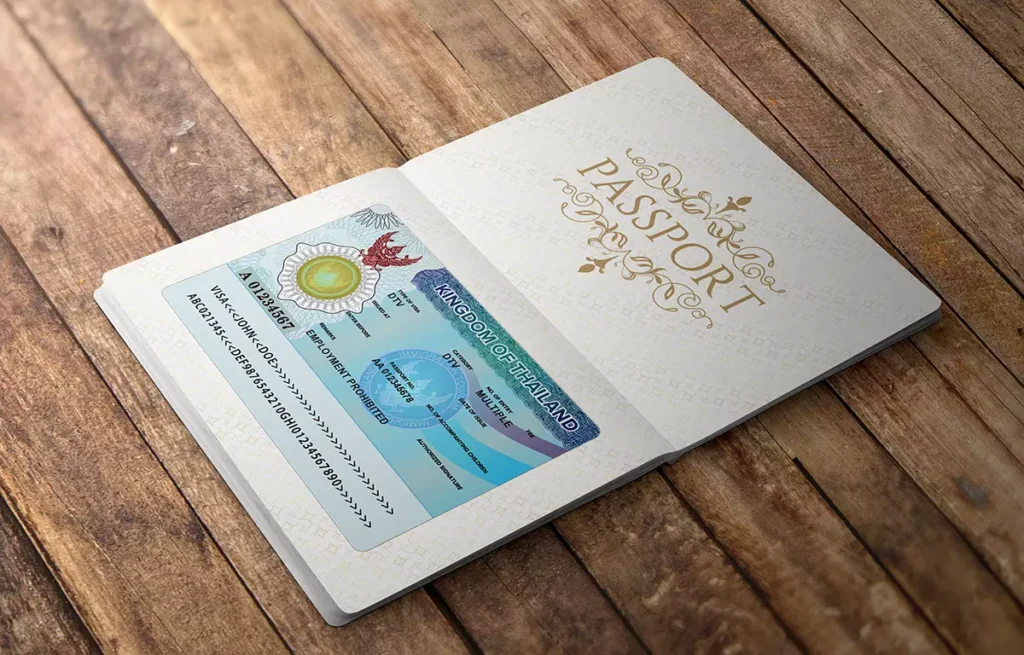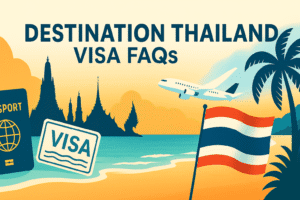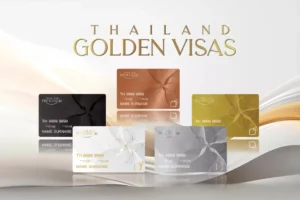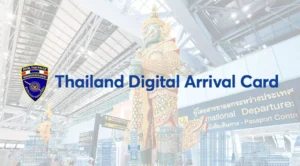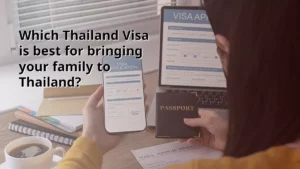The Destination Thailand Visa (DTV) is one of the newest visa options in Thailand, so naturally there is a lot of uncertainty surrounding it. Many of our clients reach out to us at Siam Legal for clarity on DTV Visa issues, so we have compiled a list of common questions we get to help others understand the DTV better. For detailed information about the visa itself, we recommend visiting our dedicated information page on the DTV Visa.
Can I extend a Thai DTV Visa?
If you don’t want to leave Thailand every 180 days to refresh your stay duration, then you have the option to extend your stay for another 180 days. This can be done at least once every time you arrive in the country allowing you to stay for up to a year without penalty. However, you’ll also need to pay a fee and receive approval from the immigration authorities for this to be possible.
Do you have to prove your purpose for having a DTV Visa every time you enter Thailand?
No, you only need to prove that you are a remote worker or freelancer, are enrolled in a Thai Soft Power Activity, or are being treated in a Thai medical facility when you initially applied for the visa. To enter Thailand, all you need to do is show your DTV. However, you may need to prove your purpose for holding the DTV when you apply for an extension at Thai immigration, so plan accordingly.
How long does it take for me to apply for a Thai Digital Nomad Visa?
How long you’ll have to wait for a DTV depends on the embassy or consulate you’re submitting your application to and the country it’s in. If you’re applying in one of Thailand’s neighboring countries (such as Laos and Cambodia), then you’ll likely receive it in a week, but all locations are different. On the other hand, if you’re applying from outside Southeast Asia, such as from the US, the DTV Visa could take between 2 to 4 weeks to be approved.
Can I leave and re-enter Thailand on a DTV?
Yes, one of the benefits of the DTV Visa is that it’s a multiple-entry visa that does not require a re-entry permit. You can make multiple trips away from Thailand and back while on this visa, so long as it hasn’t expired yet.
Who can I bring on my Destination Thailand Visa?
If you want your loved ones to accompany you on your trip, you can bring your spouse and children as a DTV holder. You will also have to submit separate applications and pay an additional fee for each member of the family, but there is no limit to how many you can bring along with you.
Can I work on a Destination Thailand Visa?
You cannot use the visa to work for a local company while in Thailand, but you can work remotely for an overseas company, as a freelancer for foreign clients, or as a self-employed professional earning foreign income. Keep in mind though that if you stay beyond 180 consecutive days, you may have to pay Thai taxes on your foreign income (see below).
If you want to work for a Thai company while living here, you would need a Thai business visa, or a different visa that allows for a work permit (see below).
Can I pay for my DTV Visa using non-cash payment methods?
No, generally the Thai embassies that are responsible for processing your application only accept payment in the form of cash. To ensure a successful application, be sure that you have enough cash to pay for all fees.
Can I use assets to satisfy the financial requirement?
No, you cannot use money tied up in any assets to fulfill the financial requirements of the DTV. Stocks, property, or cryptocurrency will not be acceptable to prove you hold the required amount of money to meet the DTV’s financial requirement. You can only satisfy these requirements through liquid assets such as cash in a savings account, which must be accompanied by an official bank statement as evidence.
Can I study at a university on a Destination Thailand Visa?
No, the DTV unfortunately doesn’t allow you to pursue your education or enroll in a university in Thailand. However, this doesn’t mean you can’t expand your knowledge by exploring other areas. You can enroll in lessons on Muay Thai, cooking, and sports, all of which are allowed under the DTV guidelines.
Can I open a business on a Destination Thailand Visa?
Yes, it’s possible to open a business in Thailand while you’re on the Destination Thailand Visa. However, if you’ll be working for the company as an authorized director or employed in any other capacity, you’ll need a business visa and a work permit. If you are only a shareholder of the company, then a work permit is not required.
Do I have to pay taxes on a Destination Thailand Visa?
Yes. While there is much hype around the DTV allowing you to be exempt from tax obligations, this isn’t entirely true. Anyone who stays in Thailand for more than 180 days out of a calendar year is considered a tax resident and is liable to pay Thai income tax. So you will need to pay taxes on a DTV if you stay for at least 180 total days in the country and bring income in from abroad.
Can I purchase any property on a Destination Thailand Visa?
While foreigners cannot generally buy land in Thailand regardless of their visa, you are allowed to purchase some forms of Thai property. As a DTV holder, you are eligible to buy, rent, and own the same types of property available to other foreigners such as condominiums. You can legally buy a house, but you cannot buy the land that it is built on. You can, however, enter into a long-term lease of up to 90 years and control the land in all but name.
What are the possible reasons for my DTV application being rejected?
Unfortunately, there’s a chance that your DTV Visa application could be rejected. If the Thai Embassy has issued you a rejection notification, there could be a number of reasons. Some of the more common reasons for this include:
- There’s insufficient proof of your finances
- One or more of your required documents are either missing or incomplete
- Some of the information you filled on the application form is inconsistent or inaccurate
- The Thai Embassy has concerns about you being able to follow visa guidelines
- The Thai Soft Power Activity you have been accepted to is not valid for the DTV
Fortunately, a rejected application does not mean you cannot try again, but you should speak to Siam Legal’s experienced Thai visa consultants to ensure it does not happen again.
Are there any alternatives to a Destination Thailand Visa?
If the DTV isn’t to your liking or you don’t qualify, here are some alternatives you can consider. Both options are examples of long-term visas which allow for extended stays in the country while working remotely.
The Thailand Privilege Visa provides you with more convenience and flexibility while you’re in Thailand. You can select from 4 distinct membership packages, each one valid from 5 to 20 years and offering a wide range of perks. The biggest selling point of this visa is the privilege points system, allowing you access to exclusive luxury perks of your choice.
The Long-Term Resident Visa (LTR) is valid for 10 years and enables you to remain in Thailand without having to fly into and out of the country throughout its duration. There are several versions of this visa, but all provide benefits not available for the DTV such as tax exemptions on your foreign income and the ability to gain legal employment in Thailand with a work permit.
I have a question that isn’t listed on this DTV FAQ, where can I get an answer?
If you want to learn more about the DTV or begin your application, then reach out to Siam Legal to streamline your experience. Having assisted foreigners with their Thai visa applications for over 20 years, our team of professionals has the skills and knowledge to provide you with all the answers you need. We’ll also help you obtain your DTV Visa swiftly and smoothly with minimal risk of delay or rejection.
Contact Siam Legal today and book a consultation with our DTV team, so you can begin a new chapter of your life in Thailand with confidence knowing immigration issues won’t disrupt your stay.







